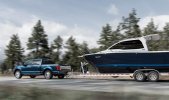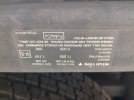It's tough to explain without writing a book, but those numbers are derived off of the SAE J684 towing standards and are most applicable to travel trailers (TT). They are generally conservative. Your hitch won't fail at 501 lbs or 700 lbs for that matter. They are guidelines that Ford came up with that take into consideration many factors for different truck configurations. You will see the same tag on a single cab short bed truck or a crew cab long bed, 4x4, 4x2, etc.
I tow our 10k lbs Islander with an 2018 f150 max tow. It's rated for 12800 lbs. My payload is 1640. It pulls and handles beautifully, but took some work to get the right balance of tongue weight, axle position, trailer angle, etc.
If I were hauling a TT I would follow the standards closely, but would make changes suitable for my application.
Boat trailers (especially with torsion axles) don't handle well with high tongue weights. Mine is only around 5%. The manufacturer says 7% max. At 7% it swayed like a SOB! The truck road terribly because the leaf spring was excessively deflected allowing axle wrap to make the spring assembly shudder. No bueno! At least that's my best guess. Now, aside from my rapidly moving gas gauge, I can sometimes forget the boat is behind me.
Short of the long, Ford really covers their rear with their ratings. You can safely do more, but you need to understand limitating factors. I don't exceed my payload, I actually know my tongue weight, my tires are correctly inflated and my engine and transmission have plenty of cooling capacity.
How many pages am I up to?




